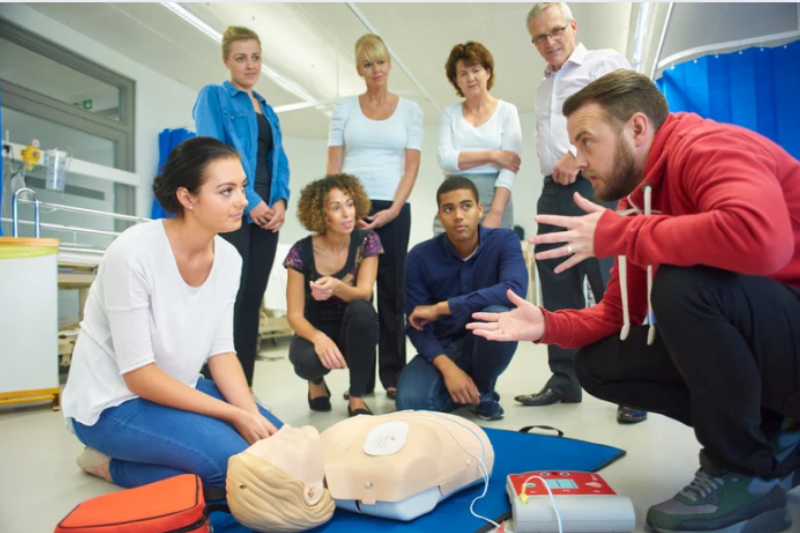Cardiac arrest is one of the leading causes of death worldwide, making high-quality CPR an essential skill that can mean the difference between life and death. At Guardian Training Center (GTC), we prioritize equipping individuals and organizations with the highest standard of CPR training, ensuring that our trainees are prepared to respond effectively in emergency situations.
High-Quality CPR Saves Lives
High-quality CPR is the primary component in influencing survival from cardiac arrest. According to the American Heart Association (AHA), delivering high-quality CPR significantly improves the chances of survival. To achieve high-quality CPR, specific performance metrics must be met:
- Chest compression fraction >80%: This means that over 80% of the time, chest compressions should be actively delivered during resuscitation efforts.
- Compression rate of 100-120/min: Consistent chest compressions at this rate ensure effective circulation.
- Compression depth of at least 50 mm (2 inches) in adults: For infants and children, compressions should be at least 1/3 the anterior-posterior (AP) dimension of the chest.
- No excessive ventilation: Proper ventilation techniques must be used to avoid reducing the effectiveness of chest compressions.
-As of 6/13/24 per the AHA
GTC's Comprehensive CPR Training Programs
At Guardian Training Center, our CPR training programs are designed to help individuals and teams achieve the competency required for high-quality CPR. Our courses are in line with the AHA's guidelines, providing both individual and team skills practice and testing in a variety of real-world circumstances and settings.
Our American Heart Association Basic Life Support for Healthcare Providers (BLS HCP) and First Aid/CPR/AED courses ensure that participants are well-prepared to deliver life-saving care in both in-hospital and out-of-hospital settings. Our certified instructors provide hands-on training that emphasizes the importance of high-quality CPR and equips trainees with the skills needed to respond effectively during a cardiac emergency.
Value in the Workplace
Implementing CPR training in the workplace is not only a valuable investment in employee safety but also a legal and ethical responsibility. Here are some reasons why high-quality CPR training is vital in the workplace:
- Increased Survival Rates: With more employees trained in high-quality CPR, the likelihood of survival for a cardiac arrest victim increases dramatically. Immediate and effective CPR can double or even triple the chances of survival.
- Preparedness for Emergencies: Cardiac emergencies can occur anywhere, including the workplace. Having trained personnel ensures that immediate assistance is available, reducing response time and potentially saving lives.
- Boosts Employee Confidence: CPR training empowers employees with the knowledge and skills to act decisively during emergencies. This confidence can enhance overall workplace safety and morale.
- Compliance with Regulations: Many industries have regulations that require specific safety training, including CPR. Ensuring compliance with these regulations protects both employees and the organization.
Legal Considerations
While the value of CPR training is clear, there are also legal considerations that organizations should be aware of:
- Good Samaritan Laws: These laws generally protect individuals who provide reasonable assistance to those who are injured or in peril. Employees trained in CPR are typically covered under these laws, encouraging them to act without fear of legal repercussions.
- Occupational Safety and Health Administration (OSHA) Requirements: Some workplaces are required by OSHA to have trained first responders, especially in high-risk environments. Adhering to these requirements is essential for legal compliance.
- Liability and Negligence: Employers have a duty of care to their employees. Providing CPR training can mitigate risks and reduce the likelihood of negligence claims in the event of a medical emergency.
GTC's Commitment to Excellence
At Guardian Training Center, we are committed to providing high-quality CPR training that meets and exceeds industry standards. Our courses are designed to be comprehensive, engaging, and practical, ensuring that participants are not only knowledgeable but also confident in their ability to perform CPR.
We offer customizable training solutions to meet the specific needs of your organization, whether you're looking for on-site training or specialized courses for healthcare providers. Our goal is to ensure that every trainee leaves our program with the skills and confidence needed to save lives.
Conclusion
High-quality CPR is a critical skill that can save lives in the workplace and beyond. At GTC, we are dedicated to providing the best CPR training available, ensuring that individuals and teams are prepared to act effectively in emergencies. Investing in CPR training not only enhances workplace safety but also fulfills a legal and ethical obligation to protect employees.
For more information on our CPR training programs and how we can customize a course for your organization, contact Guardian Training Center today.






.svg)